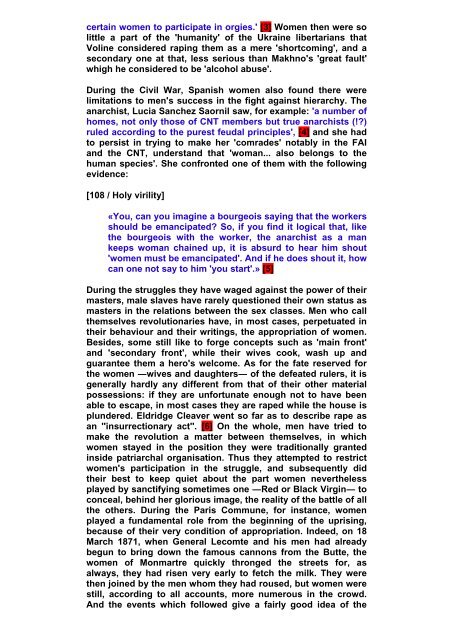emmanuel reynaud holy virility the social construction of masculinity
emmanuel reynaud holy virility the social construction of masculinity
emmanuel reynaud holy virility the social construction of masculinity
Create successful ePaper yourself
Turn your PDF publications into a flip-book with our unique Google optimized e-Paper software.
certain women to participate in orgies.' [3] Women <strong>the</strong>n were so<br />
little a part <strong>of</strong> <strong>the</strong> 'humanity' <strong>of</strong> <strong>the</strong> Ukraine libertarians that<br />
Voline considered raping <strong>the</strong>m as a mere 'shortcoming', and a<br />
secondary one at that, less serious than Makhno's 'great fault'<br />
whigh he considered to be 'alcohol abuse'.<br />
During <strong>the</strong> Civil War, Spanish women also found <strong>the</strong>re were<br />
limitations to men's success in <strong>the</strong> fight against hierarchy. The<br />
anarchist, Lucia Sanchez Saornil saw, for example: 'a number <strong>of</strong><br />
homes, not only those <strong>of</strong> CNT members but true anarchists (!?)<br />
ruled according to <strong>the</strong> purest feudal principles', [4] and she had<br />
to persist in trying to make her 'comrades' notably in <strong>the</strong> FAI<br />
and <strong>the</strong> CNT, understand that 'woman... also belongs to <strong>the</strong><br />
human species'. She confronted one <strong>of</strong> <strong>the</strong>m with <strong>the</strong> following<br />
evidence:<br />
[108 / Holy <strong>virility</strong>]<br />
«You, can you imagine a bourgeois saying that <strong>the</strong> workers<br />
should be emancipated? So, if you find it logical that, like<br />
<strong>the</strong> bourgeois with <strong>the</strong> worker, <strong>the</strong> anarchist as a man<br />
keeps woman chained up, it is absurd to hear him shout<br />
'women must be emancipated'. And if he does shout it, how<br />
can one not say to him 'you start'.» [5]<br />
During <strong>the</strong> struggles <strong>the</strong>y have waged against <strong>the</strong> power <strong>of</strong> <strong>the</strong>ir<br />
masters, male slaves have rarely questioned <strong>the</strong>ir own status as<br />
masters in <strong>the</strong> relations between <strong>the</strong> sex classes. Men who call<br />
<strong>the</strong>mselves revolutionaries have, in most cases, perpetuated in<br />
<strong>the</strong>ir behaviour and <strong>the</strong>ir writings, <strong>the</strong> appropriation <strong>of</strong> women.<br />
Besides, some still like to forge concepts such as 'main front'<br />
and 'secondary front', while <strong>the</strong>ir wives cook, wash up and<br />
guarantee <strong>the</strong>m a hero's welcome. As for <strong>the</strong> fate reserved for<br />
<strong>the</strong> women ―wives and daughters― <strong>of</strong> <strong>the</strong> defeated rulers, it is<br />
generally hardly any different from that <strong>of</strong> <strong>the</strong>ir o<strong>the</strong>r material<br />
possessions: if <strong>the</strong>y are unfortunate enough not to have been<br />
able to escape, in most cases <strong>the</strong>y are raped while <strong>the</strong> house is<br />
plundered. Eldridge Cleaver went so far as to describe rape as<br />
an ''insurrectionary act''. [6] On <strong>the</strong> whole, men have tried to<br />
make <strong>the</strong> revolution a matter between <strong>the</strong>mselves, in which<br />
women stayed in <strong>the</strong> position <strong>the</strong>y were traditionally granted<br />
inside patriarchal organisation. Thus <strong>the</strong>y attempted to restrict<br />
women's participation in <strong>the</strong> struggle, and subsequently did<br />
<strong>the</strong>ir best to keep quiet about <strong>the</strong> part women never<strong>the</strong>less<br />
played by sanctifying sometimes one ―Red or Black Virgin― to<br />
conceal, behind her glorious image, <strong>the</strong> reality <strong>of</strong> <strong>the</strong> battle <strong>of</strong> all<br />
<strong>the</strong> o<strong>the</strong>rs. During <strong>the</strong> Paris Commune, for instance, women<br />
played a fundamental role from <strong>the</strong> beginning <strong>of</strong> <strong>the</strong> uprising,<br />
because <strong>of</strong> <strong>the</strong>ir very condition <strong>of</strong> appropriation. Indeed, on 18<br />
March 1871, when General Lecomte and his men had already<br />
begun to bring down <strong>the</strong> famous cannons from <strong>the</strong> Butte, <strong>the</strong><br />
women <strong>of</strong> Monmartre quickly thronged <strong>the</strong> streets for, as<br />
always, <strong>the</strong>y had risen very early to fetch <strong>the</strong> milk. They were<br />
<strong>the</strong>n joined by <strong>the</strong> men whom <strong>the</strong>y had roused, but women were<br />
still, according to all accounts, more numerous in <strong>the</strong> crowd.<br />
And <strong>the</strong> events which followed give a fairly good idea <strong>of</strong> <strong>the</strong>
















